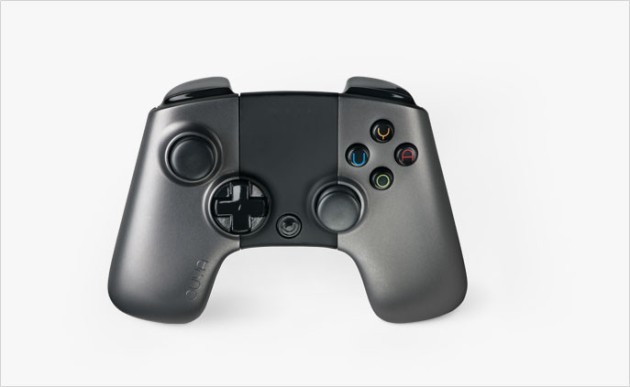 "Valve has just announced that developers will now be in charge of their own pricing on Steam. This is the beginning of PC games prices drifting downwards, with an endpoint of zero. Here's why." ...
"Valve has just announced that developers will now be in charge of their own pricing on Steam. This is the beginning of PC games prices drifting downwards, with an endpoint of zero. Here's why." ...
Michael.neel
Shared posts
Blog: Valve has started PC games' race to the bottom
Michael.neelI see a lot of fear over Valve allowing developers more freedom, but I think if you need to "control" a market to keep it profitable, you're already not in control. Good, bad, or ugly the model and method of selling games is changing, but worry not you do not have to change: survival is not mandatory =)
Humble Bundle Insta-Post-Mortem - by Andy Schatz
Michael.neelIt great to see these posts detailing the numbers behind sales and bundles. As expected, the king of the bundles is not really so humble and pays okay.
Autodesk to shut down Softimage and ship final version next month
Michael.neelNo surprise here, this is pretty much what Autodesk does - buy competition and kill it. I will miss Softimage if for no other reason than, for a while, it was free to XNA Creators Club members and I modeled my first mech with it.
 Autodesk announced today that it will cease updating its 3D modeling and animation utility Softimage in April. The final version, Softimage 2015, will reportedly ship around April 14. ...
Autodesk announced today that it will cease updating its 3D modeling and animation utility Softimage in April. The final version, Softimage 2015, will reportedly ship around April 14. ...
This 15 year old MMO just received its last content update
Michael.neelAsheron's Call was the second MMO I spent a lot of time with (the first was Ultima Online). I've actually looked at activating my account again and playing with my daughters, but the subscription price of $13/mo per account seemed a little steep for the age of the game. I have a lot of respect for Turbine and the developers behind AC for creating an MMO that wasn't your typical Tolkienesque setting. Wi Flagged For Life!
 Turbine has stated that the content update released today for Asheron's Call will be the last. There is no plan to add more content to the game. ...
Turbine has stated that the content update released today for Asheron's Call will be the last. There is no plan to add more content to the game. ...
Dear Esther Unity: How..?
Michael.neelLooking at porting an existing game to Unity? Robert has the first post up on what it's taking to port Dear Esther. His prior article is also worth reading for some experience in outsourcing a port, and where that can go wrong.
The Reality of Virtual Reality
Michael.neelI love this post from Cliff because I had also fallen into the trap of thinking in terms only of what exists now ported to virtual reality. Now I've got all kinds of ideas for pushing the envelope, and really want to order an Oculus Rift - I just need that whole "doesn't work with coke bottle glasses" thing solved.
DISCLAIMER: I’m an investor in the Oculus Rift. I’m also a believer in the technology. I think it will be truly game changing, not only in games, but also in many, many other fields. I am NOT an official spokesperson for the technology and I consider many of the folks working on it to be friends, so please understand this is my personal opinion regarding the technology.
It seems like every time a good/great 3d game comes out one of the first things I almost always read on the Internet is
"OMG IMAGINE THIS ON THE OCULUS RIFT."
STOP.
STOP.
FFS STOP.
With the overwhelmingly positive response that Titanfall has gotten I’ve seen this train start up, once again.
It’s one of those things that drives me bonkers, kind of like when people refer to Lego as Legos. (Google it, dammit.)
You can’t just dump a game on the Oculus just like you can’t just throw a PC FPS on console without massive tuning. The pacing of the experience, the controls, everything needs to be re-tuned so much that you might as well just start from scratch for the Oculus.
A fast paced shooter simply doesn’t work well on the device. The device is so game changing that the experiences built for it need to be custom, unique and designed from the ground up FOR VIRTUAL REALITY. The experience needs to be much more like swimming through water or hopping around in low gravity as opposed to being an Olympic hurdler. Even horror games will need to be re-thought; instead of jump scares and intense “Outlast” experiences horror on the Rift will need to be the super subtle type otherwise your average person will only last 15 seconds in any given jump scare title before tearing the headset off.
Having seen the latest of what the tech has to offer (and I believe a myriad of experiences are going to continue to blossom for the emerging tech) there’s one sensation that I couldn’t get out of my head, and it’s the true feeling of flight. I have a recurring dream in which I’m being chased by a monster and if I concentrate hard enough I start flying up, up and away, gleefully flipping off whatever beast is in pursuit. In one of the recent demos, when I looked down, I had that very same sensation of flight and it was thrilling.
I have never, ever had that outside of a dream. Ever.
And for those of you who like to dismiss the tech saying “Oh it’s just like 3d, no one will want it” you obviously haven’t used it. When 3d is properly used in the theater for depth as opposed to a baseball coming at your face (See Avatar and Gravity for good uses) it is incredibly immersive. The problem is that most folks don’t really want it in their home. The effort of putting on the glasses isn’t worth the result in your average home setup outside of someone who has, well, an IMAX in their house.
The Rift is an IMAX in your house, and then some. The effort of putting on the headset leads to an overwhelmingly fantastic result. When you put on the latest demo and you crouch and lean around the new world around you your brain adapts, adjusts, and you’re there. I have memories of the places I visited in the latest demos. I felt like I could have reached out and touched things. It was the most magical experience I’ve had with technology since the first time I saw an Atari 2600 joystick manipulate pixels on my friend’s TV in their basement many, many years ago and decided then that I wanted to make games.
So, for the love of god, give the device more credit than just tossing random FPS games on it. It deserves much, much more. And you’re darned right I invested in it, because I’d like to think I know a good thing when I see it. :)
/rant
Vlambeer: Just making games is the key to becoming successful
Michael.neelThis is a theme I repeat often, and not enough. Make games by making games. It's that simple.
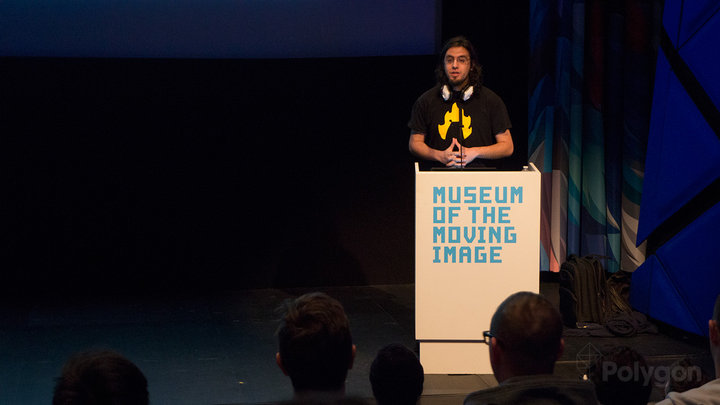
Rami Ismail usually introduces himself as "one half of Vlambeer," the Dutch indie studio behind games such as Ridiculous Fishing and Nuclear Throne; the other half is designer Jan Willem Nijman. In a keynote address at IndieCade East 2014 today, Ismail chronicled both of their lives, from birth to the present. He wasn't just telling the audience his life story and Vlambeer's history — he was illustrating their rocky, unique path to success, and the thrust of his speech was that there's no single definitive way to make it as a game developer.
"I was a really unruly kid back in elementary school," said Ismail, before explaining that a teacher, in an effort to get him to focus, introduced him to chess at the age of 5. That was Ismail's...
Miss Steam Dev Days? Watch the video presentations here
Michael.neelFree indie developer conference content, House of Cards can wait!
 Last month, Valve invited select developers to Washington for its first-ever conference. Now, anyone can watch the presentations on the web. ...
Last month, Valve invited select developers to Washington for its first-ever conference. Now, anyone can watch the presentations on the web. ...
Getting to 'yes' on Steam Greenlight, with a hidden-object game
Michael.neelThis is a really great insight into what it takes, and how much it takes, to make it through Steam Greenlight. I'm not too thrilled to see buying votes ("We promised each member who voted for us ... a free copy of the game") is part of the process, but I also have to admit that the the free copies given away are no worse than low/no paying bundles and probably resulted in many more votes.
 How did the developers of a hidden object game get through the Steam Greenlight process -- when the service's fans are notoriously negative about casual titles? ...
How did the developers of a hidden object game get through the Steam Greenlight process -- when the service's fans are notoriously negative about casual titles? ...
Why Indie Developers Go Insane
Michael.neelI didn't get time to write up any thoughts on the Flappy Bird saga (suck it King, I called it a saga!), but with this post there is no need. Jeff makes the point better than I could have.
 |
| We all have our little mantras we use to get through the day. |
Then, as I got older, I realized that I am crazy too.
Then, as I got even older, I switched to a better truth: Everyone is crazy. Every human has his or her damage. Nobody gets out of this world alive.
It's just that indie developers tend to have high visibility, high stress, and small support groups. These factors mean that, when these devs break, you see it, and it's spectacular. Twitter has only helped to make self-immolation faster, easier, and more public.
A lot of people love indie games because they can so clearly be the product of real people. They aren't focus-grouped, penny-pinching, soulless chum. At their best, they have character. You might not like my games, but you can tell I CARE. They're works of love, recognizably the product of passionate brains.
And, since we care about the product of these brains so much, it's sometimes worthy to look at the brains themselves. Brains that spend half their time receiving more accolades than they deserve and half their time being the target of laserlike hate. These crazy, crazy brains.
I wanted to write a bit about the brain of the indie developer under stress. I don't want pity. I just think someone might find it interesting to read what it can be like to be in this particular box.
 |
| Simple. Free. Ad-supported. Indie. Popular. Addictive. BURN IT! |
For years now, the iTunes (and lately Google Play) app store has been this gigantic, rushing torrent of infinite money, and everyone has scrambled to grab their piece.
It's the most soulless, joyless, metric-obsessed market/ethics-free-zone imaginable. There is nothing that can't and won't have all fun and creativity sucked out of it to earn an extra penny from the "whales" (i.e. compulsives) who will happily shell out a hundred bucks a month to get Candy Crush Saga to let them play Bejeweled. (Hot tip: Uninstall Candy Crush Saga and play all the Bejeweled you want forever ad-free for three bucks.)
So for the last couple weeks, people, when they weren't raging about EA's pillaging all of their happy memories of Dungeon Keeper, were noting the runaway success of a tiny, free, ad-supported game called Flappy Bird.
Let's be clear. It's not a great game. It was written in three days by a young Vietnamese man named Dong Nguyen. It's really simple, crushingly difficult, pretty derivative, weirdly addictive, and marketed purely by word of mouth. And it became a huge hit, sucking the attention away from a million equally derivative money-sinks.
According to the author, Flappy Bird was averaging $50K a day. So here come the haters ...
 |
| Shut up, canada.com. |
The Internet exists to crap all over everything. And Flappy Bird is simple, silly, derivative, and casual-friendly, so it was sure to bring the self-styled Defenders of Gaming out of the woodwork.
And why do people object to it?
One. The gameplay is similar to many earlier games. Well, of course. Flappy Bird is very similar to a host of press-the-button-to-make-the-helicopter-or-bird-stay-in-the-air games going back years. So what? Here's a news flash. If you write any sort of simple game, there is a %99.999 chance somebody already did it.
You can't copyright gameplay for a reason. If you could, small developers (including me) would never stand a chance.
(Many have claimed that Flappy Bird is a ripoff of a game called Piou Piou, which is laughable if you bother to actually try the games. They play entirely differently.)
Two. The art style is super-similar to early Nintendo games. Yes, Flappy Bird's art is reeeeeally close to some Nintendo games that came out in the last century. I've never seen proof that assets were lifted. It's just similar.
So what? Again, you can't copyright an art style, for a reason. If your art style could never be similar to someone else's, small developers (including me) would never stand a chance.
Three. The game is pretty rough. So what? If people choose to play it, nobody voted you the Queen of Gaming. It is so, SO not your business. I think players of Candy Crush Saga or mobile Dungeon Keeper are getting rooked and could get a lot more similar fun elsewhere for way less money, but I'm not running up and down the subway slapping the iPhones out of their hands.
Want to see people hate on Flappy Birds for no good reason? Look at this gross bit of anti-journalism from Kotaku. As of my writing this, the article begins with an update that basically says, "We changed the title of this article as it was pure slander." (Kotaku has since apologized for this piece, so thanks for that, I guess.)
Or look at this vicious example. Or this straight-out slander from the famed game critics of, um, canada.com. (At least Kotaku apologized.) Or, on in the best pretentious grad student style, this hilariously bizarre article in The Atlantic.
Or read the petty, jealous comments of any article on it. I promise you the author has. Every single one. Which is why this happened ...
 |
| Going ... |
Dong Nguyen quit. A fortune coming through the door, and he walked away. As I write this, Flappy Bird has been removed from app stores.
Think about this. I mean you, personally. Think about what it would take to make you run from a gold mine like this. Really. Think about why someone would do this.
This is not about money.
If you've experienced any time as a public figure, especially one that is mainly hated on, it makes a lot of sense.
Dong Nguyen is a young guy. He wrote a game for fun, put it out there, and found himself at the target end of a massive wave of attention, much of it negative. I can't stress enough how insanely terrifying this can be, and he wasn't ready.
Hardly the first time this happened. Remember when Phil Fish, the successful author of Fez, canceled Fez 2 and quit the industry in a fit of pique? I've never been Phil Fish. I don't know exactly what was happening in his head when this happened. But it did happen, and I can totally relate.
It can be hard to understand why someone would kill a product that's making a fortune. Anyone can say, "Oh, gee. He has money. Who cares?"
Well, I promise you, there are things that money can't buy. If you are going mad, you can't buy yourself sane. Some people can take this sort of attention. Not everyone. And some people can take it, but it makes them ... weird.
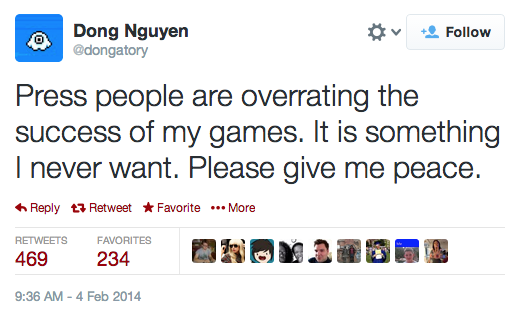 |
| ... going ... |
I've been the target of my fair share of hate. Real example: E-mails from angry schizophrenics. People who tell me they hope I go out of business and my kids never go to college. Pictures of me Photoshopped in various unflattering ways.
And, of course, the occasional truly unhinged message that I forward to my friends and ask, "Tell me honestly. Should I be worried about my safety here?"
I've been doing this for a long time, and I have a pretty thick skin. Even then, this stuff has an effect. You can't help it. It's part of being human. One angry message has more effect than ten friendly ones. It has a real psychic weight. And, once you know it's there, turning off your computer and avoiding Twitter doesn't remove it.
When my games had their own Humble Bundle, I should have been happy. I mean, I was, in a way. It'll help send my kids to college, and who could argue with that?
Yet, I spent that week in my room quivering with terror. When my developer/writer/artist friends find themselves in similar situations, they are often the same. I've been asked, "This is going so well. Why do I feel horrible all the time?" We neither expect nor deserve sympathy, but that's what happens.
And when an indie dev becomes the hate target of the day, isn't up to it, and loses it a bit, the public responses are the same.
Suppose one day I get one insult too many, I go nuts and quit or freak out. Here's what people will say about me: What a weakling. What a wimp. What an idiot. Why does he care? Why doesn't he just turn the social media off? Why can't he be tough and awesome like me? Screw that guy.
All this, of course, from people who have never experienced being in even remotely the same position.
A Quick Aside
Everyone jokes about how supposedly soulless PR and marketing people are, but dealing with the masses is difficult, time-consuming, and an actual skill. To survive emotionally in a high-profile situation, you need a layer of protection between yourself and the raw feedback of humanity.
If Dong Nguyen got a PR flack, stayed off forums, and just wrote games, he could make a lot of money. However, as he has said himself, this isn't the sort of life he wants to live, and I can't blame him.
But if you've ever seen a public figure (politician, actor, musician, and yes, game designer) have a weird, inexplicable public flame-out, it might make a little bit more sense now.
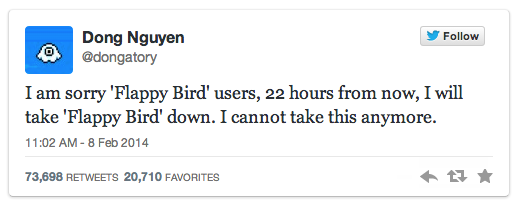 |
| ... gone. You see? Trolling does work! |
Reality is what it is. We devs would never have our attention and success without the Internet, but you have to take the good with the bad. If you want the attention, you also have to face the Hate Machine.
Sometimes it seems (accurately or not) like every gamer on the Internet seeks out their own little rantbox. A place to direct rage at their chosen target. Young male teens on one side, social justice warriors on the other, general cranks everywhere. Everyone has their axe to grind, and shouting is fun.
People have the right to give feedback, too. If I want to call out the Dungeon Keeper app or the hacky articles I linked to above, it's something I should be allowed to do. If you make your work public, people get to respond.
Trolling is annoying. (Though one man's troll is another man's brave truth-teller.) People troll because it works. When someone writes, "[Some developer] is a moron and his games suck," and the developer reads it, it hurts. You can't prevent it. It's just how our brains work.
I don't think this can ever change. (Though less slander from reporters who should know better would be nice, of course.) It's not about a broken system. It's about understanding, empathy, and remembering that the work you are shouting about was written by another human. An actual human, with feelings and stuff. And humans can be surprisingly fragile.
Saying that won't make any difference, of course. Haters gonna' hate. Trolls gonna' troll. But it feels nice to remind people occasionally, just the same.
---
Anyone who wants to hear more of my ramblings can follow me on teh Twitter.
Edit: Fixed a typo and made it clear one of the pieces linked was not actually by a grad student.
Schafer: How to stay afloat in "a pool of Internet Twitter hate"
Michael.neelSome really good comments from Tim on dealing with the launch of Broken Age, particularly how the press and outsiders had an established a narrative for the state of the game and were more interested in confirming that story rather than looking at the facts. Great advice here for small studios who handle their own PR.
The Indie Ego
Michael.neelThis is a great insight to some of the extremes of the indie game development community. One of these days I'll get around to writing up the "best" we saw at GameMarx (and by "best" I mean "worst").
The Wrong Image
Since starting Indie Gamer Chick on July 1, 2011, I’ve met literally thousands of people involved in indie game development. Typically, they are the coolest men and women on the planet. The type of people I would want to be friends with. Humble and grateful, eager to please and excited by the prospect of improvement. They strive to be better. They relish the thought of being the underdog. They wow me with their intelligence and awe me with their creativity. They inspire me to be better at what I do. And I’m not talking about two or three standouts. I’m talking the overwhelming majority of the community.
So, why does a perception that indies are aloof, pompous, self-indulgent, out-of-touch, thin-skinned, egotistical fart-sniffers exist?
Well, because a small handful of indie game developers are aloof, pompous, self-indulgent, out-of-touch, thin-skinned, egotistical fart sniffers. From my experience, they’re not at all representative of your typical indie dev. They represent a stereotype that I find damaging to the community I love, so I figure I should try to eliminate this mindset.

The first developer who contacted me was the creator of this, A Hard Game Without Zombies. My review was not a positive one. Developer MasterGroke took it with grace and humility. It was a sign of things to come. After 500 reviews, only five developers ever showed a lack of grace in handling it. Read the types of reviews I write and then ask yourself if the indie perception is accurate.
You Don’t Get Me
Any creative medium will attract personalities that have no concept of humility. It’s the nature of artistic expression. You see it in movies, television, stage, music, and modern art. Indies have been around since the dawn of games, but it’s only recently that mainstream attention and ease of distribution have become prevalent. So now, you see a lot more people with that artsy, pretentious, “nobody gets me” personality. Thanks to Indie Game: The Movie, many people believe the scene is dominated by this type of character. It’s not. Most indie game developers are humble and friendly. I wish more people watching that had come away saying “man, those Super Meat Boy guys were awesome!” instead of focusing on the developers who were, for a lack of a better term, unlikable.
The indie scene has grown a few prominent stars. Some of them are, by most accounts, really cool guys. I’ve heard a lot of people tell me Minecraft creator Notch is a good dude. I’m pretty good friends with Thomas Was Alone developer Mike Bithell. He’s one of the nicest guys I know. As for Notch, while he might have eccentricities, he certainly doesn’t carry himself like he’s better than anyone or that people don’t fundamentally “get him” or his artistic vision.
There was some scuttlebutt over Braid when it was released. It was a hugely critically acclaimed game. It was probably my favorite indie that I had played before I was Indie Gamer Chick. But developer Jonathan Blow wasn’t happy with the feedback, because he felt reviewers and critics didn’t get what he was aiming for, either reading too much into it or not enough. Jonathan Blow does a lot of great things for indie developers and is a wonderful advocate for the community. Unfortunately, the way he handled the reception of Braid made him come across as incredibly pretentious. Because of his visibility, that’s done a lot of damage to the image of indie game developers.
People are going to have different interpretations of your work, reading into it all kinds of things you never imagined while you were developing it. Lord of the Rings creator J. R. R. Tolkien spent most of his twilight years shooting down any and all theories on what Lord of the Rings might be a social commentary on. Nuclear weapons? Class warfare? Race relations? He had none of that in mind. “I cordially dislike allegory in all its manifestations, and always have done so since I grew old and wary enough to detect its presence” he often said.
So when you put your work out there, be ready for people to not experience it exactly how you envisioned. When this happens, have a laugh over it. If their misinterpretation has had a positive effect on their life or outlook, why would you want to shoot that down? Most developers understand this. The few that don’t, that get very possessive of their vision, they’re the ones that bring the whole community down. I roll my eyes at a lot of attempts at gaming as art, but I’m just one person. I know people who were genuinely moved by Datura, which I hated. Many of my fans read a lot more into Limbo than I did, to the point that I went back to play it, actively searching for a way to see it the way they did. The thing is, they’re not wrong, and neither am I. Art interpretation is always in the eye of the beholder. As a developer, once your game is out on the market, you’re not the beholder anymore, and you have to accept that.
The Indie Bubble
Many of the more image-damaging indie developers live in what I call the “Indie Bubble.” It’s a bubble almost completely removed from the world you and I live in. Where developers can image a world where their insecurities can be addressed without having to incorporate things like “reality” or “facts” into it. Unfortunately, the Indie Bubble still has access to Twitter or blogs, meaning their delusions get exposed to a group of people who live in what is known as the “real world.” And the people living in the real world are so not ready to play along with their fantasies.
Earlier this week, while discussing the economic problems of the Wii U (as I did two weeks ago in this editorial), a developer from within the Indie Bubble told me that indies could, no, WOULD, save the Wii U. I responded by saying that indies can’t move consoles. Indie Bubble developer responded by saying he knew people who had bought a Vita just for the indies on it. I responded by pointing out that the Vita isn’t exactly the most successful game machine out there. In fact, it’s doing quite poorly. More over, if indies could significantly move consoles, the Ouya would be a runaway success right now, instead of being, well, the Ouya.
The developer responded by saying I was coming across as anti-indie. Not because I said I hate indies, or that indies are crap, or that most indie games suck. No, I had committed the sin of being realistic. Also, it’s hard to convey exactly what I meant in 140 characters. Yes, there are people out there who will buy game machines just to play the indies. Most of these people stick to PCs, where the majority of high-quality indie games are at. On the console side of things, those who are primarily looking for indies will simply not be statistically significant. Anecdotal evidence of “I know people who bought a Vita just to play indies” doesn’t mean that’s how most of the world works. Especially when you and the people you hang out with are in the bubble.
Journey was probably the most critically acclaimed game of 2012. It’s my all-time favorite PlayStation 3 game. The most common response to my review of it was “man, I wish I had a PS3!” Not “I’m going to run out and buy a PS3.” Journey simply didn’t move consoles. It didn’t when it was bundled with Flower and Flow and released on disc. Indies just plain aren’t good at that. Blockbusters move consoles. Indies are a wonderful side dish. They serve to provide content that is not on-trend, so that gamers of all stripes have something for them on a gaming device. The indies that get promotional effort from the manufactures often tend to be released outside of peak-seasons, assuring top-quality content year-round. So indies serve a function. I would dare say, indies are essential to the modern console business model. There’s no need to boost your egos and placate your insecurities by making absurd claims like “indies move consoles.” That makes you sound like a lunatic.
Absurd claims are a running theme with the fringe Indie Bubble crowd. Another one I got this week was “all games come from indies.” I responded simply with “Madden?” The developer’s response: “Never heard of it.” That’s the Indie Bubble. And the Indie Bubble is the most dangerous thing the community’s image faces. “Never heard of it.” Oh please. See, there’s nothing wrong with being proud of being in the indie community. But when you’re not grounded in reality, it makes you tough to root for.
Just to quickly clear up the “all games come from indies thing”, the first video game console was developed and funded by a defense contractor. Video games evolved from people within the military industrial complex. The man behind it, Ralph Baer, was meticulous in his methods, making sure every little detail was profitable and patentable. When Atari came out with Pong, his company successfully sued Atari, who ended up a licensee. By signing the license, Atari assured that the military contractor would stomp their competition with great zeal, protecting their patent. Does this sound indie to you? Because it doesn’t to me. I bring this all up because, when I called out the theory that all games are inspired or come from indies for the bullshit that it is, they typically reach back to the origins of gaming, when a model railroad club designed the first PC game during recreational lab hours. If you have to reach that far back to make your point, you have a weak argument.
The ultimate asinine statement is “Indies are the only REAL artists in gaming.” It’s a shitty attitude to have, and it completely undermines your own contributions to gaming, because it makes you guys look like beret-wearing. art-house assholes. The kind of people nobody likes, that nobody wants to see succeed. Chances are, if you work in the game industry, you’re a creative person. Even the most design-by-committee titles like Call of Duty or Gears of War are built by people who do their best to put their personal touch on their work. Indies have built an “us versus them” mentality that shouldn’t exist. You’re all artists. Don’t allow the freedom you have as an indie developer turn you into an elitist.
With Fans Like You..
Criticism is subjective, and not all my reviews are popular. A recent trend I’ve had to deal with is, when someone disagrees with one of my reviews, I’m called a “Call of Duty player.” For fans that have entered the Indie Bubble, this has become the ultimate insult. It’s like “Yo Momma” for people who love the scent of their own flatulence. This idea that people who play indies shouldn’t play mainstream games is so damaging to the community. Gaming is a big tent. Indie games should tackle issues that mainstream games can’t possibly do, but the community at large should be welcoming to gamers of all stripes. When the hardcore, indies-only crowd starts using games like Call of Duty or Gear of War or Halo as pejorative insults, they’re telling people “you’re not welcome at our party.” That’s bad for developers, because the hardcore fans are making their work less accessible. Would you want to be part of a community populated by people who regard the games that inspired you to buy your console with contempt? Of course, like developers, the majority of hardcore indie game fans are not assholes. They don’t consider the act of playing a game like Madden to be an affront to the scene. But for those in the bubble, they would rather see games sell less than have people like me, who enjoy all aspects of gaming, from being part of their community. When I reviewed NES Remix, someone outright called me an enemy of indie gaming. When I said that review brought all kinds of attention to my blog from non-indie fans, who then were exposed to an entire different crop of games as a result, the person responded with “I don’t care.”
Back in 2012, when Halo 4 was released, I spent a few weeks inviting my fans to play with me and my friends online. Those living in the Indie Bubble, especially non-developer indie fans, were hugely insulted that someone called “Indie Gamer Chick” would play such a game while actively promoting the scene. I have done similar events with indie games, and a big problem with those is getting participants. Indie games typically fill specific niches. When myself, my fellow XBLIG critics, and the developers at Milkstone Games had a little impromptu Little Racers STREET event, we had trouble filling all the spots. Even though we were actively giving away free copies of the game to get enough players in. When Brian and I were looking for fans of Terraria to trade items with, finding interested parties was shockingly difficult. For Halo, the moment I said “anyone want to play?” I had a queue that lasted for days. I was able to expose more people to indies just from the ease of access Halo offered than I would have literally handing out free copies of an indie game.

Little Racers STREET supports up to twelve players online. Even bribing people to play, we only had seven or eight at most at any given time.
But, because I was preaching the gospel of indies from a Halo pulpit, I was the enemy. People were calling me things like “fraud” or “poser” simply because I was playing Halo. If there’s one thing I hope people take away from this piece, it’s that those inside the Indie Bubble don’t speak for the community. The majority of indie fans and developers are amazing people who welcome newcomers to the scene with open arms. It’s one of the few online communities where newcomers are so readily accepted. Those fans who want us filthy mainstream game players to stand clear? They’re not part of the indie community. They’re in their own world. The difference between their side and the side I’m on? My side wants them, and everyone, to be a part of our community. The more, the merrier. Indie fans who say things like “go play Call of Duty” are essentially telling the millions of Call of Duty players that them and their money are something indie developers can do without. On behalf of the indie developers who you did not consult when saying that, kindly shut the fuck up, please.
In Conclusion
There is no such thing as the “Indie Ego.” The majority of indie developers are down to Earth and humble, while indie fans are normal gamers just looking for ideas off the beaten path. I wish the perception of the scene was more in line with reality. Yes, some developers are egotists who insult fans, throw tantrums, and sniff their own farts. Yes, some indie fans are obnoxious, elitist, uptight dorks. But they are not the standard bearers for indies, and gamers need to know that.
Indie gaming doesn’t breed these kind of personalities. Some people are just born to be douchebags. While I was catching shit from those in the Indie Bubble, an indie music critic fan of mine told me “welcome to my world.” An independent film-maker friend of mine said “you could change “console” to “studio” and publish this as critique on the indie movie scene.”
A friend of mine took a look at an early draft of this editorial and hypothesized that success is a factor in “the Indie Ego” perception. It’s been known to change people. You’ll notice that a lot of the guys I would label as being type-A personality developers, IE the kind that are most in need of a good slap across the face, are the ones that are typically the most successful. It’s been suggested to me that my positive experience with the community is in large part because most of my developer friends haven’t had a large level of fame or recognition.
I don’t think its true. When you see a developer meltdown over a bad review or people talking shit on his game in the Steam forums, success has nothing to do with that. I’ve had developers who have never caught a whiff of success threaten me with lawsuits or try to organize a Reddit mob to “get me.” Some people are just not capable of handling the type of feedback you receive when you’re a creative person. That’s why some developers laugh and tell disarming jokes when they’re accused of being a hipster, while others declare that they’re cancelling their next game, like a bratty eight-year-old taking their ball and going home. It’s very unfortunate that, in such situations, the response from those outside the community is “well, that’s indies for you.”
No. The correct term is “that’s assholes for you.”
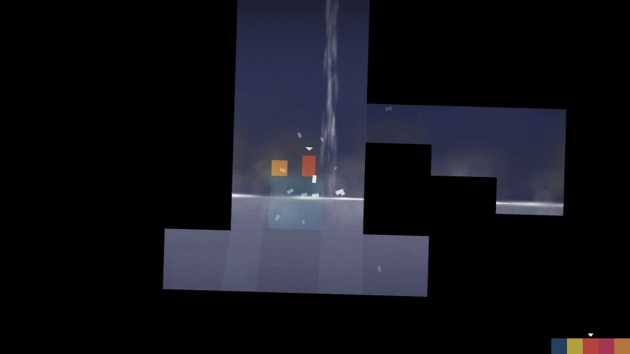
I heard someone say this week “I wish more developers were like (Thomas Was Alone creator) Mike Bithell.” Um, dude. Most developers are. He’s an amazing human being, like most indie devs. If most indies were more like Phil Fish, I wouldn’t be doing this. Hell, there wouldn’t be an indie scene.
So, if you’re a true fan of indies, make sure you set the record straight whenever you get the chance. Indies are not about elitism or self-glorification. They’re about freedom of creative expression. They’re about childhood dreams realized. Indies are community-oriented, helpful to a fault, and anxious to excite fans of all shapes and sizes. That is the real indie community, where you’ll find most fans and developers. Those other guys? They’re in the Indie Bubble. They might tell you they speak for the community, but they don’t. They claim to love indies, but their behavior does not show that. They insult those they perceive as “not indie enough.” They have no tolerance for anyone who doesn’t interpret their world view. And they willfully drive away new people from the scene. Guys, you’re not helping. I know you’re not capable of realizing that, but I figure I should try. Indies need a thriving, growing community to succeed. You guys are essentially advocating indie obsolesce. If you’re in the bubble, you need to quietly reflect on if that’s the community you want to be a part of. And while you reflect, crack a window or something, because the lack of oxygen in the bubble seems to be affecting your brains.
Chris Remo leaves Double Fine
Michael.neelIf you are not already, you should be listening to the Idle Thumbs Podcast. Probably the best game developer podcast going right now and one of the few places left that hold honest discussions of current games.
Level design in a procedurally generated game
Michael.neelThis is a great high level breakdown by the level designer how to craft an engaging procedurally generated level system. I swear spell check, "procedurally" is a word!
 A level designer who was personally invested in hand-authored content describes exactly how her team approaches procedurally generated content in its games -- step by step. ...
A level designer who was personally invested in hand-authored content describes exactly how her team approaches procedurally generated content in its games -- step by step. ...
Why You Should Never Use LegalZoom or use DIY Online Documents - by Jonathan Sparks
Michael.neelThe reasons given are worth considering, but skips over the case where sometimes you just want the "standard" agreement so you can move in. In our case we needed a company split equally among three owners and LegalZoom was perfect. I think before you consider a lawyer or DIY site you should just talk with everyone involved and work out the details and goals, and only then formalize it.
Using player data for platformer design
Michael.neelGreat write up on using analytics to tweak game design.
 Social game developers often use analytics, but how do you capture player data for a traditional genre, the 2D platformer? This post shows how one team did it. ...
Social game developers often use analytics, but how do you capture player data for a traditional genre, the 2D platformer? This post shows how one team did it. ...
Blog: Turning your Steam Machine into a dev kit
Michael.neelNice write up on using a Steam Machine as a dev kit for testing, and also how to get under the hood of Steam OS in general.
 Get a Steam Machine? This post explains how to turn it into a dev machine, enabling "easy deployment of software, remote control (starting and killing of processes, grabbing screenshots), and remote debugging." ...
Get a Steam Machine? This post explains how to turn it into a dev machine, enabling "easy deployment of software, remote control (starting and killing of processes, grabbing screenshots), and remote debugging." ...
Dungeon Keeper stacks deck in EA's favor when it comes to Android feedback
Michael.neelEA's "Rate this app" screen only takes you to Google's Play store if you rate the game 5 stars, any less and you are redirected to an internal EA forum, keeping negative feedback internal and private. Aside from the obvious, disgusting, EA behavior this should be the kind of thing Google takes an app down for - it's in effect manipulating review scores shown to new customers.
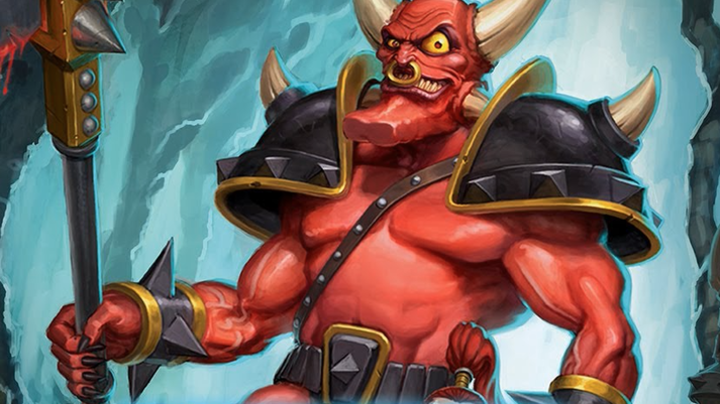
The Android version of EA's Dungeon Keeper does its best to prevent users from providing negative feedback.
You can vote on Double Fine's Amnesia Fortnight 2014 games
Michael.neelThe pitches at the end of the video are great. Double Fine is really becoming any amazingly creative studio, well beyond just "Tim's Studio". I think I can say this is the only studio I would want to work for.
Double Fine Productions is opening up its annual internal two-week game jam, Amnesia Fortnight, to the public again this year through the Humble Bundle website, the studio announced today.
Amnesia Fortnight, which Double Fine started doing in 2007, is a period during which everyone at the studio stops what they're doing and breaks off into small teams to develop games in two weeks. A number of Double Fine's recent games, including Costume Quest, Stacking and Spacebase DF-9, originated as Amnesia Fortnight prototypes.
Double Fine began asking fans to vote on Amnesia Fortnight projects in 2012: People can spend a minimum of $1 to vote on the ideas that get prototyped, and watch them being developed in documentary videos made by 2 Player...
Amazon purchases Killer Instinct maker Double Helix Games
Michael.neelWith the Ouya struggling to gain marketshare, the SteamBox out of the price range for most, and both the PS4 and XboxOne lacking in games, is there room for another console in the market? It is amazon however, so would free "Games with Prime" get you to buy a system?
Online retailer, tablet-maker, and media streamer Amazon has extended its reach further with the purchase of Double Helix Games, best known of late for developing the reboot of Killer Instinct for the Xbox One launch. TechCrunch was the first to report the acquisition, and Amazon soon confirmed it, saying in a statement that the move was “part of our ongoing commitment to build innovative games for customers.”
The Irvine, California-based Double Helix was formed in 2007 from members of The Collective and Shiny Entertainment, and since then it has primarily worked on contract games based on other companies’ IP, including Silent Hill: Homecoming, MX vs. ATV Reflex, and the game version of the Battleship movie. The developer is currently working on a reboot of the 16-bit platforming classic Strider for PC and consoles. All 75 Double Helix employees will remain in Irvine, according to the TechCrunch report.
Amazon’s latest acquisition renews the rumors, first reported last summer, that the company is planning to release an Android-based game console to build off of its robust Android App Store. The latest unsourced rumors on that score suggest that console will be powered by a Qualcomm processor and released some time this year for under $300. Amazon has also reportedly been courting Android game developers to add controller support to their games for months now.
Read on Ars Technica | Comments
Twitch beats Facebook, Amazon in U.S. online traffic
Michael.neelThis is impressive, also impressive is the PS4 accounts for 20% of Twitch.tv steams. Given that Let's Plays are YouTube top content how long before someone tried to bring back G4?
Blog: Free-to-play - Poisoning the well
Michael.neelThis is a good overview of the current state of Free-to-play and the opinions around existing implementations. I think one part missing from the discussion is the types of gamers who are playing mostly F2P titles. I would wager that these gamers are not the typical "serious" gamer most developers target with their games, and thus leave "casual" gamer to the conglomerate F2P wolves.
 "Vampiric. The concept of a game out to make less of your time stuns me. This game, and games of its ilk, set out, set out to make your un-paid time less valuable than the time you paid for." ...
"Vampiric. The concept of a game out to make less of your time stuns me. This game, and games of its ilk, set out, set out to make your un-paid time less valuable than the time you paid for." ...
Flappy Bird is proof that no one knows what the audience is looking for
Michael.neelAnother story about Flappy Bird and its "magic" rise up the charts. I think it's obvious - there is a share button on the score page that tweets a link to the app on the AppStore. I'm sure if you trace the tweets you'll see how this helped the app spread like a zombie plague in Atlanta, GA. That and the fact it's a well designed mobile game.
Five common questions about trademark protection - by Zachary Strebeck
Michael.neelSure, "ask your lawyer" is the best answer for legal advice but that's not always in the Indie budget (you know, the budget that has the promissory note to make your PhotoShop install "legit" as soon as the sales start?). However reality is you're going to be legal counsel for yourself along with every other role in small business and this is a good start to understanding trademark law.
I Have Cracked the 3D Pedagogical Nut!
Michael.neelCharles Petzold, the master sage who scribed Programming Windows, will be writing a series of articles teaching the fundamentals of 3D programming by use 2D. I often face the same challenge (teaching 3D programming is no small task when the student has never word in 3D before) and am really looking forward to Charles's approach.
There is nothing quite so immediately gratifying as graphics programming. Specify a few coordinates in a program, and you can draw a line right on the screen. From there you can build it up, add curves, enclose and fill areas, and experiment with different types of brushes. Start animating the coordinates and colors, and you're off.
... more ...
Nintendo discusses unified architecture for next portable, console systems
Michael.neelInteresting direction for Nintendo and one that, if it works, could keep the console maker relevant in the face of PS4 and XboxOne. I wonder how far this "Nintendo Platform" could go? Maybe when Iwata said they were "going to look at mobile" he didn't mean make games for phones, but make the phones themselves. Would you get a Nintendo Phone?
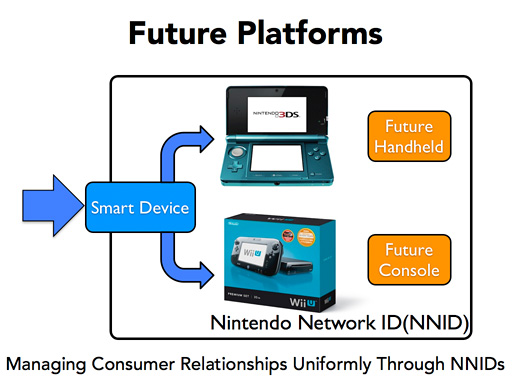
Less than a year and a half after a major console launch is usually too early for a console maker to be discussing its plans for the next hardware generation. With the Wii U and 3DS both struggling to meet expectations, though, Nintendo President Satoru Iwata seems more willing to hint at very early plans for the company's next generation of systems.
In a recently translated Q&A session with investors, Iwata highlighted how a unified architecture between portable and home consoles could help the two sides of Nintendo's business "become like brothers in a family of systems." That statement follows a recent briefing from Iwata where he vaguely discussed the notion of unlinking the concept of a video game "platform" and a specific piece of hardware.
Iwata noted that Nintendo's portable and home console development groups were united into a single team last year. In the past it made sense to keep those teams separate, Iwata said, due to inherent differences in portable and console design, such as power draw, hardware size, and so on. "However, because of vast technological advances, it became possible to achieve a fair degree of architectural integration," he said.
Read 7 remaining paragraphs | Comments
Read Satya Nadella's first letter to employees as Microsoft's CEO
Michael.neelMicrosoft ended up promoting from within. This letter is interesting - will the "One Microsoft strategy" allow divisions like Xbox room to innovate or does it mean new projects are doomed if they don't fit the current company goals? Whatever his plan, Satya should sharing soon - the suspense is literately killing the company!
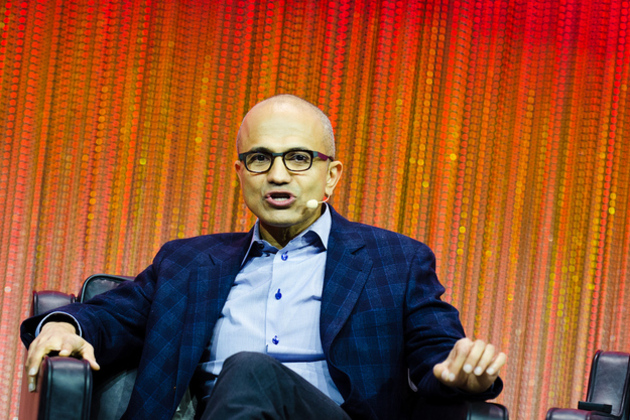
It's official, Satya Nadella is Microsoft's next CEO, and on his first day on the job he's sent a letter to the whole staff. In the letter, Nadella speaks of what he thinks makes Microsoft a great company, and where he thinks it can go in the future. He warns that "While we have seen great success, we are hungry to do more. Our industry does not respect tradition — it only respects innovation." Nadella also lays out a bit of his plan for the company. He mentions that he requested Bill Gates to help out more than he has in the past few years, and perhaps more importantly, he speaks generally of focusing the company on what it does best. He says "We need to prioritize innovation that is centered on our core value of empowering users and...
Screenshot Scrutiny – 1st February 2014
Michael.neelReally happy to see this is still a thing, and that sites are still covering it. If it's Saturday and you've got a game in progress, be sure to tweet a screenshot!
Something rather beautiful in the game development community is Screenshot Saturday. Developers simply take a screenshot of what they’re working on, and then tweet it with the #screenshotsaturday hashtag, and it immediately appears on the website. It’s like magic, or something. In Screenshot Scrutiny, we select some of the more intriguing screenshots and delve into the information they hold!
Big Bad Spanish
Be careful with your love bro! #screenshotsaturday #gamedev http://t.co/YY8DpqXDY8 pic.twitter.com/gbkgPjfL1Q
— Bob Byrne (@clamnuts) February 1, 2014
Language games have always shared a soft spot in my heart, but I must admit I’ve never played any that look as entertaining and relatable as Big Bad Spanish. The developer behind the game, an amazingly talented comic artist and writer called Bob Byrne (@clamnuts), tells how Big Bad Spanish was born out of his own struggles learning the language and teaches the user by “immersion, brute force and humiliating trial-and-error.”
The game also employs realistic conversations that can go from pleasantries to insults, depending on where you steer it, and every character you converse with has a patience level. So, unlike most language-learning games, you can actually yank your conversation partner’s chain.
For any of you who have learned a foreign language before and accidentally made a gigantic ass of yourself, this probably sounds pretty familiar to you! For that reason, I think Big Bad Spanish will be an extremely entertaining, educational and honest play if you want to brush up on your Español.
Paradigm

http://t.co/dPVO0XkWN7 Postcard for Paradigm an adventure game. It is used for navigation within the first act #screenshotsaturday
— Jacob Janerka (@JacobJanerka) February 1, 2014
Paradigm is a beautifully illustrated point-and-click adventure game that pulls most of its inspiration from Eastern European settings of the 1970s to 1980s. Set in an odd fantasy world in our near future, the game tells a story about genetic engineering, corruption and, of course, about the protagonist, Paradigm.
The result of a horrible genetic mutation, Paradigm is dumped in a near deserted town and left to fend for himself. Natural reaction? He dreams to be the best electronic musician ever to grace the earth. For an intriguing storyline and gorgeous, stylistic art direction, definitely check Paradigm out.
Demise of Nations: Rome
Another one: City view of Rome! Anyhow, that's an ALPHA-screenshot. #screenshotsaturday pic.twitter.com/J8Tk7Pnp5I
— Christoph Aschwanden (@noblemaster) February 1, 2014
If you’re a fan of strategy games, Demise of Nations: Rome should qualify to creep onto your watchlist. Based on the historical rise and fall of the Roman Empire, the developer released the first alpha version of the game today, which is open to applications to test it. Based on the WEGO system (so that all players can enter their turns simultaneously), the game claims to be more realistic and truer to real-life decision making.
Already including a whopping 22 nations, including Carthage, the Greeks, the Spartans, Germania, the Celts and more, Demise of Nations: Rome looks like a fun, sleek strategy game to keep an eye on.
Ashen
A rare glimpse into the world of Ashen for #screenshotsaturday . Visit our blog for more: http://t.co/l5SIYQ76Pc pic.twitter.com/84jufpmapQ
— Aurora44 (@aurora44games) January 31, 2014
Ashen. No, not the horror FPS for the N-Gage. Developed by Aurora44, Ashen is an action-adventure game set in an unforgiving, open world. It’s hard to say whether or not it’s in the same vein of modern survival games like DayZ or Rust, but there are hints of it in its developer’s log here. It looks like players will be able to build, or at least find necessary shelter, and that there’s some constant element of danger. The game will also feature day and night cycles.
If you’re into it, the developers have spoken in some depth about the importance of camera angles and camera movement in games, and what sort of system they’ll be employing for Ashen. You can read Part I and Part II on their official website.
The Wild Eternal
How about another one with less compression? I hope… #TheWildEternal #ScreenShotSaturday pic.twitter.com/SkS1Pepeeb
— Scott Goodrow (@ScottGoodrow) February 1, 2014
A game currently in development by two brothers, Casey and Scott Goodrow (or self-described as two dudes who can’t decide on a studio name), The Wild Eternal’s entry into Screenshot Saturday this week already piques curiosity with a purple-eyed creature staring straight into your soul. You know beasts are magical when even their tail glows, so you probably shouldn’t mess with it.
Manifesting itself as a first-person exploration game with unbeatable enemies, a lot of fog and some bizarre conversations with a fox god who thinks you’re their long lost beau, The Wild Eternal wants you to find your way through the world, even though you’re as lost as a penny wedged down the folds of a couch. Just… don’t break the fox’s heart, okay, man? That’s cruel.
The Foxy Journey
follow our progress on
http://t.co/4kFmeZCU6y
http://t.co/8yHzUaYYnE
#ScreenShotSaturday #indie #game pic.twitter.com/b3rkjMHUzh
— NGKLabs (@NgkLabs) February 1, 2014
I’m not sure if this is called Fox Journey, Foxy Journey or The Little Fox Journey, but it doesn’t really matter. Whatever name the developer decides upon, this game is already looking fantastic. Just check out some of these screenshots and GIFs from its TIGSource devlog.
According to the devlog, Foxy Journey is in its early stages of development, an exploration and puzzle-based platformer inspired by the likes of FEZ and Zelda II. Yeah, I know. There are a lot of games like that, but it’s hard to say no to art that’s so pretty! Until we find out more, just soak in these shiny hexels.
[Title Unknown]
#screenshotsaturday The Deer God #indiegames #gamedev @piwotgames pic.twitter.com/GnerIrzkyr
— Crescent Moon Games (@CM_Games) February 1, 2014
Described only as an “atmospheric survival=platformer,” this very early work-in-progress caught our eye, despite having very little information to publicly offer as of yet. Mysterious!
#screenshotsaturday Added several items today. One lets you push asteroids at enemies. http://t.co/cfBWozVErL pic.twitter.com/vln5WvSnEe
— XenoRaptor (@XenoRaptor) February 1, 2014
Whack-A-Dungeon UI mockup #screenshotsaturday pic.twitter.com/DK7IiYindg
— Whack-A-Dungeon (@WhackADungeon) February 1, 2014
#gamedev #screenshotsaturday Progress on #InnkeeperTales :inventory, outfitting and shopping handling all done! pic.twitter.com/S8nR4iFFIz
— Roberto Dillon (@rdillon73) February 1, 2014
Here's a look of gameplay in #TechnoDash with new HUD Mockup.
#ScreenshotSaturday #IndieGames pic.twitter.com/JkcF5oLrtW
— Justin Cox (@Ammypendent) February 1, 2014
Our artist is working on some new art for #Oblitus! #screenshotsaturday pic.twitter.com/LVMkBF4EQc
— Oblitus (@OblitusGame) February 1, 2014
Beware of turrets. Many turrets. #screenshotsaturday pic.twitter.com/i4esdSodee
— Jack Squires (@Duende_Games) February 1, 2014
 Tags: indie games, indie statik, screenshot saturday, screenshot scrutiny
Tags: indie games, indie statik, screenshot saturday, screenshot scrutinyCopyright © Indie Statik [Screenshot Scrutiny - 1st February 2014], All Right Reserved. 2014.
The post Screenshot Scrutiny – 1st February 2014 appeared first on Indie Statik.
Xbox One Trolls Trick People Into Using Bing
Michael.neelI wonder how many Kinects were unplugged following this video?
The Castle Doctrine review: at the door
Michael.neel"Ultimately The Castle Doctrine is a video game that seems to value its message above your time." I think the developer has a hit on his hands if he adjusts some of the tedious gameplay, but this quote sums up the current game quite well.
Some games are fun from start to finish. There are games that exist only to spread joy, with each new challenge serving to heighten your sense of accomplishment. Then there are games that are nothing but challenge, with the joy emerging subtly, from the feeling that you've stretched your abilities, mastered difficult concepts or simply survived.
Created entirely by developer Jason Rohrer, The Castle Doctrine is neither of those games. It's...

